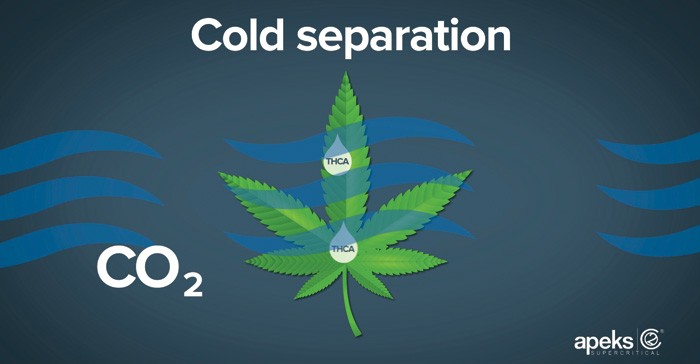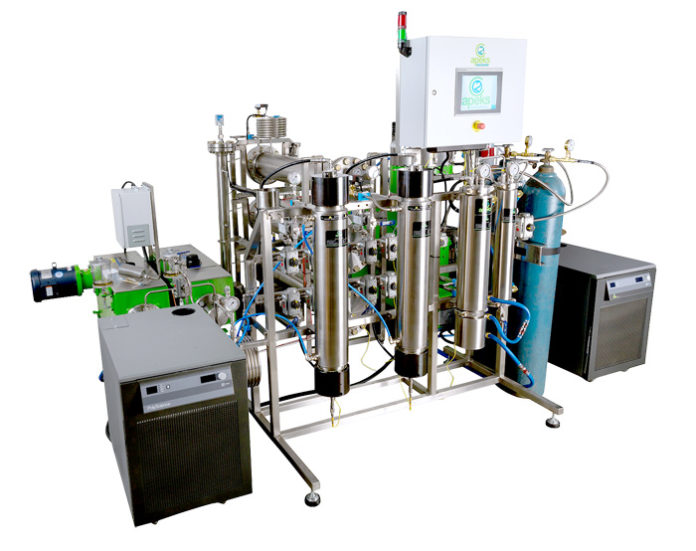If cannabis-extract processing companies could produce more oil extract faster and at a higher quality level, they’d probably jump at the chance, right? And if the process could be fully automated, they’d probably jump twice as high. That helps explain the success of Apeks Supercritical. The Ohio-based manufacturer of CO2 extraction systems, under the leadership of Chief Executive Officer Andy Joseph, has been building botanical extraction systems since 2001—first as a fabrication specialist before becoming a full-fledged manufacturer in 2012.
A former Navy nuclear engineer, skilled hands-on builder, and the 2016 Ernst & Young Entrepreneur of the Year for the Ohio Valley, Joseph holds five patents, including the valveless expansion technology featured in all Apeks CO2 extraction systems. So, how did he get here?
“Originally, I got connected with a group that wanted me to build some botanical oil extraction equipment,” he said. “I had no idea what that even was, but I said, ‘Sure. I’ll give that a shot.’” It’s obviously worked out well, as Apeks has grown significantly. “We’re up to thirty employees, including seven degreed engineers,” Joseph said. The company has delivered and installed 430-odd systems in twenty states across the U.S. as well as in Canada, Mexico, and Europe. More international customers are on the way.
THREE YEARS, EXPLOSIVE GROWTH
While Joseph said the business is changing so fast he can’t even hazard a guess about his company’s market share, he estimates there are now about thirty CO2 equipment manufacturers in a space where only three or four years ago there were three. Bottom line: His company’s revenues swelled from $750,000 in 2012 to $13 million in 2015. Needless to say, things are looking up, and Joseph likes his company’s competitive advantages.
“Because we’re a manufacturer of such long standing, we’ve got a purpose-built, 17,000-square-foot facility that does nothing but build CO2 systems. We’re able to take advantage of manufacturing efficiencies and utilize more expensive components but still be one of the lowest-cost providers in the space.”
Low cost is relative, of course. Apeks Supercritical’s introductory extraction systems start at $39,000, while larger mid-range models begin at $108,000. The company’s high-end production beasts cost at least $279,000. All of them represent a lot of bang for the buck, extracting oil from seven to ten pounds of dried cannabis in twenty-four hours with one of the introductory systems and up to 100 pounds per day for the high-end models. The systems are scalable and built on the same technology. Apeks even offers a 75-percent return credit on introductory systems, so people can get in, test the waters, and trade up if they’d like.

More important than the raw numbers, of course, is the enhanced quality Joseph said stems from Apeks Supercritical’s unique cold-separation engineering process.
“The fundamental design of all our systems is that we maintain the separation vessel cold; that’s really the crux,” he said. “A lot of attention and focus goes into the extraction vessel, because that’s what it is: It’s an extractor. But you’ve got to realize the oil that’s been extracted sits in the separation vessel while it’s waiting for the operator to come and harvest it. While it’s sitting there, if the system pumps a bunch of heat into that vessel, it doesn’t really matter what the original extraction parameters were.”
Heat—or lack thereof—is super important, even critical, in producing thermally sensitive oils like cannabis, especially its volatile terpenes and flavonoids.
“Our test data shows that our extractors have better THCA retention, an indication there’s not decarboxylation happening in our systems,” Joseph said. “Other competitive manufacturers who aren’t thermally sensitive, they’ll have an uncontrolled decarboxylation that happens throughout the extraction process. Our motto is ‘Decarb on your terms, not the machine’s terms.’”
Apeks Supercritical’s versatile extractors can fractionalize the oil into different weights to suit processors’ needs, and Apeks’ machines can do both subcritical and supercritical extractions using the power of non-toxic CO2 (gas or liquid) as a solvent at pressures up to 5000psi. Unlike butane or propane extraction methods that can add heavy metals to the extract, CO2 easily separates from the oil after extraction the same way soda goes flat. (Still, processors must beware pesticides or other impurities in a batch of pot. A small amount of pesticides going in becomes a large quantity of pesticides in the concentrate, which requires a separate post-extraction process to remove.)
Other features of Apeks CO2 extraction systems include patented valveless expansion technology to eliminate clogging and special diaphragm compressor technology that produces 20- to 50-percent faster extractions using half the power. The machines also feature two levels of safety protection, data-tracking capabilities, and CO2 recovery up to 95 percent.
FULL AUTOMATION, NO AGGRAVATION
Joseph said another key advantage of Apeks’ systems is they’re fully automated. Traditional manually operated set-ups might have forty or fifty valves an operator must know when to open and close. For botanical oil processing companies, this is an operational issue that also has a big personnel component, because, as Joseph noted, “You have to find a really good operator who has the skill-set to do it and also isn’t smoking the product. And that can be challenging sometimes.
“We decided it was time to get the operator out of the equation with wholly automated systems,” he added. “With our machines, the operator can set the operating parameters and walk away. We call it ‘lights-out automation.’”
No operator intervention is required, though taking control manually is always an option. The system can be configured to send email or text alerts when the machine needs attention or when a run is complete. Plus, all Apeks systems include on-site installation and training.
POLITICS, 2016: PROBLEM OR OPPORTUNITY?
Asked whether the 2016 election results might throw a wrench into the works for Apeks Supercritical’s success, Joseph characterized the outcome as a mixed bag.
“On the one hand, from the perspective of making marijuana available on the medical front to patients who need it, it’s scary to see what guys like [President Donald Trump’s Attorney General nominee] Jeff Sessions might do to restrict medical cannabis,” Joseph said. “I hope we’ve got enough inertia to keep progress going. Is twenty-nine legal medical states enough to be able to sway these guys or convince them they’re fighting an uphill battle at this point? I hope so.
“On the flip side, a little bit selfishly for our business, I kind appreciate a bit of a slowdown,” he continued. “It seems counterintuitive, but we’re a small company, and we’ve been able to be successful. I’ve said for a long time that the cannabis industry is the perfect storm, a once-in-a-lifetime event, that the legal landscape has just enough risk to keep the big boys out, but at the same time, there’s explosive growth that really gives an opportunity for the little guy to win.”
LEARNING WITH CUSTOMERS
Joseph noted most of Apek Supercritical’s buyers are in the processor category, especially in mature markets like Colorado, Washington, and Oregon. Only rarely do dispensaries buy Apek’s units, he said, unless the dispensary has its own grow.
“We’re seeing a bit of a surge from the cultivator side, where some who cultivate are seeing an opportunity to become processors themselves, to get further value from the material they generate,” he said.
When navigating an ever-changing market, caution and creative expansion go hand in hand. Educating customers shouldn’t be left out of the mix.
“One of our red flags, I suppose, is when we have a potential customer contact us and say ‘I want to buy an extraction system,’” Johnson noted. “We say, ‘Okay, great. What are you looking to make?’ And they say, ‘I want to make everything. I want to make edibles, I want to do vape pens, I want to make pebbles. I want to make it all.’”
In an era of increasing specialization, that’s problematic, Joseph said. Three or four years ago, when there weren’t so many players, companies could get away with a “jack of all trades; master of none” strategy.
“Today, I strongly recommend customers pick one product and focus on it until they’re good at it, then move on to the next one,” he said. “The idea that you can come into today’s marketplace without a good plan for what product type you’re going to make is a recipe for failure. The shelves in dispensaries and recreational and medical markets are crowded.”
One pitfall is finding enough feedstock to keep up with today’s fast extractors. Another is knowing exactly what to do with the oil that’s produced and what kind of secondary process is required for each product. Not all edibles are created equal. Chocolates and cookies, for instance, require completely different processes. With any edible, because the marketplace is increasingly crowded, producers probably need to work with a good chef, as well as develop strategies for branding, marketing, advertising, and social media.












